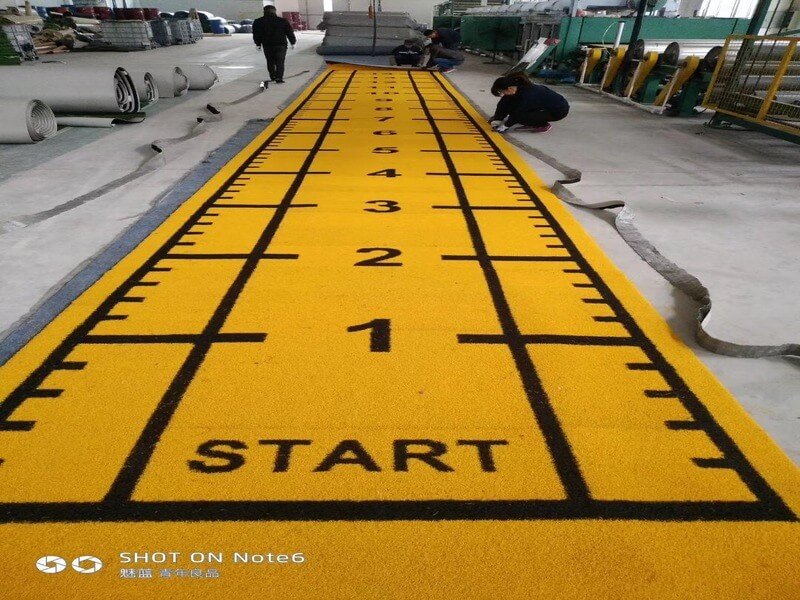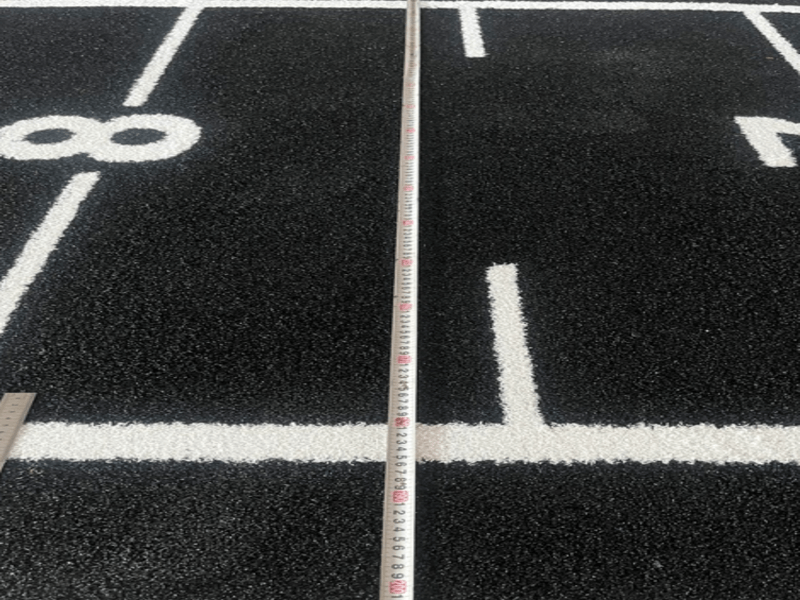Before entering the gym turf distribution market, understanding key performance standards is essential for success. Critical standards include SGS fire resistance (Ef1 rating), anti-slip certification (R12), REACH compliance for chemical safety, and CE marking under EN 15330-1:2013 for sports surfaces.
Understanding gym turf performance standards goes beyond basic product knowledge – it directly impacts your business success and customer safety. As a distributor, I’ve learned that customers increasingly demand verified performance data, not just marketing claims. The gym turf market requires products that meet specific technical requirements, from pile height consistency to chemical safety standards. When you distribute products with proper certifications, you gain competitive advantage and build lasting customer relationships. These standards also protect you from liability issues and ensure your products perform as promised in demanding fitness environments.

The fitness industry’s rapid growth means gym owners are more educated about flooring requirements than ever before. They ask specific questions about fire safety ratings, slip resistance values, and environmental compliance. Without proper standards knowledge, you risk losing sales to competitors who can provide detailed technical specifications and certification documents.
Decoding Gym Turf: Unique Performance Opens Diverse Fitness Scenarios?
Gym turf delivers superior performance through specialized yarn construction, precise density control, and multi-layer backing systems. Key features include 100% polyethylene monofilament fibers, 62,500 stitches per square meter density, and total weight ranging from 2,800-4,500 g/m² depending on model specifications.
Modern gym turf represents a significant advancement over traditional carpeting or rubber flooring. The technical specifications I’ve analyzed reveal three distinct product categories, each engineered for specific fitness applications. The GYMXM-20 model features pure curled fibers with 20mm pile height, delivering optimal performance for functional fitness areas. Its 42mm total tuft length provides excellent shock absorption while maintaining surface stability during high-intensity workouts. The GYMXM-15PU variant includes polyurethane foam backing for enhanced cushioning, while the GYMZQ-25 combines straight and curled yarn technology for multi-purpose applications.
Understanding Yarn Technology and Construction Methods
The yarn characteristics define performance capabilities. Polyethylene monofilament construction offers superior durability compared to traditional multi-filament alternatives. The 5,500-8,500 Dtex fiber thickness ensures consistent performance under heavy use. Production method matters significantly – tufted construction provides better fiber retention than woven alternatives. The curled monofilament design creates natural resilience without requiring infill materials, reducing maintenance requirements and eliminating dust generation common with rubber crumb systems.
Density and Weight Specifications Impact Performance
Stitch density directly correlates with durability and user experience. Products with 62,500 stitches per square meter offer optimal balance between comfort and longevity. Total weight specifications indicate backing thickness and overall construction quality. Heavier products (4,500 g/m²) include foam backing for enhanced cushioning, while lighter options (2,800 g/m²) focus on surface performance. The gauge measurements (3/16 inch to 5mm) affect pile distribution and surface consistency across different product lines.

Different fitness activities require specific surface characteristics. Functional training areas benefit from firmer surfaces, while stretching zones need additional cushioning. Understanding these requirements helps match products to customer needs effectively.
Gym Turf Quality Assurance: Industry Standards and Certification Overview?
Currently, no dedicated standards exist specifically for gym turf products. However, relevant standards include EN 15330-1:2013 for artificial grass sports surfaces, fire safety standards like EN 13501-1, and environmental compliance through REACH and RoHS regulations for comprehensive quality assurance.
The absence of gym-specific standards creates both challenges and opportunities for distributors. While traditional artificial grass standards provide baseline requirements, gym applications demand additional considerations. Sports surface standards focus primarily on ball bounce and impact absorption, which may not address functional fitness equipment compatibility or multi-directional movement patterns common in gym environments. This gap means distributors must understand multiple standard categories to properly evaluate and market gym turf products.
Ensuring Safety and Performance: Relevant Standards for Gym Turf
Are There Currently Dedicated Standards for Gym Turf in the Industry?
No dedicated gym turf standards currently exist in the industry. Most manufacturers reference sports surface standards or develop internal testing protocols. This gap creates opportunity for distributors who understand applicable standards from related industries. The lack of specific standards means evaluating products requires knowledge of artificial grass, sports flooring, and safety regulations simultaneously.
Applicability of General Artificial Grass Standards in Gym Turf Applications
General artificial grass standards provide valuable baseline requirements. EN 15330-1:2013 covers dimensional stability, pile retention, and weather resistance – all relevant for indoor gym applications. However, these standards don’t address equipment compatibility or specific gym usage patterns. Understanding these limitations helps distributors communicate product capabilities accurately while identifying additional testing needs.
Reference Value of Sports Flooring Related Safety Standards
Sports flooring standards offer crucial safety benchmarks. Slip resistance testing, impact absorption measurements, and surface consistency requirements translate directly to gym applications. Understanding these standards helps evaluate product suitability for specific fitness activities. DIN standards for sports surfaces provide useful reference points for performance evaluation.
Key Performance Indicator Standards That Need Attention
Critical performance indicators include pile height consistency (±10% tolerance), stitch rate uniformity, and backing adhesion strength. Fire resistance ratings (Ef1 classification) ensure safety compliance, while anti-slip certification (R12 rating) addresses user safety during intense workouts. Total weight specifications indicate construction quality, with margins typically ±8-10% for quality products.
Introduction to Wear Resistance, Resilience, and Anti-Aging Test Standards
Wear resistance testing simulates long-term use patterns. Lissajous machine testing provides standardized wear evaluation. Resilience testing measures surface recovery after compression. UV aging tests ensure color stability and fiber integrity over time. These tests become particularly important for gym applications where equipment contact and high traffic patterns create unique wear challenges.
Importance of Fire Rating Standards (Such as EU EN 13501-1)
Fire safety standards are mandatory for commercial installations. EN 13501-1 classification system provides clear performance ratings. Ef1 rating indicates excellent fire resistance suitable for indoor fitness facilities. This certification is often required for insurance and building code compliance. Understanding fire classification helps distributors address safety concerns proactively during sales discussions.
Environmental and Hazardous Substance Limit Standards (Such as REACH, RoHS)
Environmental compliance has become increasingly important. REACH regulation requires disclosure of substances of very high concern (SVHC). RoHS restricts hazardous substances in electrical equipment. These standards ensure product safety and environmental responsibility. All tested SVHC substances in candidate lists must pass requirements for market acceptance.

Understanding environmental standards helps address customer concerns about indoor air quality and sustainability. Many fitness facilities prioritize eco-friendly materials for member health and corporate responsibility goals.
Authoritative Certification: Enhancing Product Trust and Market Competitiveness?
Third-party certifications from SGS, TUV, and similar international testing organizations provide independent verification of product performance. These certifications enhance distributor credibility, satisfy project bidding requirements, and minimize safety liability risks while building customer confidence.
Professional certifications transform product marketing from claims to facts. When customers see SGS fire resistance certificates or TUV anti-slip testing results, they understand your products meet international standards. This documentation becomes especially valuable during competitive bidding situations where technical specifications determine winner selection. Certifications also demonstrate commitment to quality that justifies premium pricing compared to uncertified alternatives.
Common Third-Party Testing and Certification Organizations
Role of International Certification Bodies Like SGS and TUV
SGS provides comprehensive testing services for artificial grass products. Their fire resistance testing follows EN 13501-1 protocols, while slip resistance testing meets DIN 51130 standards. TUV certification adds credibility through independent verification of manufacturer claims. These organizations maintain testing laboratories worldwide, ensuring consistent standards application. Their reports carry international recognition that facilitates market entry across different countries and regions.
Qualifications of Domestic Related Testing Centers
Domestic testing centers offer cost-effective alternatives for basic certifications. However, international certifications carry greater market credibility, especially for export opportunities or multinational fitness chains. Consider certification strategy based on target market requirements. Local certifications may suffice for domestic markets but international expansion typically requires globally recognized testing organizations.
Value of Certification for Distributors
Strong Proof of Product Quality, Enhancing Customer Trust
Certifications provide tangible proof of quality claims. Rather than relying on manufacturer statements, you can present independent test results. This documentation particularly valuable when competing against lower-priced alternatives without proper certifications. Customers can verify certification authenticity through testing organization databases, adding credibility to your sales presentations.
Meeting Qualification Requirements for Specific Project Bidding
Major fitness facility projects often require specific certifications for bidding eligibility. Fire safety certificates, environmental compliance documentation, and performance test results become mandatory submission requirements. Without proper certifications, you cannot participate in high-value opportunities. Understanding which certifications are required for different project types helps prioritize certification investments.
Avoiding Potential Product Safety Risks
Certified products reduce liability exposure. If safety incidents occur, certification documents demonstrate due diligence in product selection. Insurance companies may offer better rates for distributors handling certified products, recognizing reduced risk profiles. Legal protection becomes particularly important in commercial applications where public safety concerns create significant liability exposure.

The certification process requires initial investment but pays dividends through enhanced market position and reduced business risks. Consider certification costs as marketing investments rather than additional expenses.
Wnioski
Understanding gym turf performance standards positions distributors for market success through quality assurance, customer confidence, and competitive differentiation advantages.
Ready to Elevate Your Gym Turf Distribution Business?
Don’t let your competitors gain the advantage with superior product knowledge and certifications. Contact us today to receive detailed technical specifications, certification documents, and free samples of our certified gym turf products. Our team of production process engineers is ready to support your distribution success with comprehensive product training and technical support.
Get your free samples and pricing information now – contact us immediately to secure your market position with certified, high-performance gym turf products.
